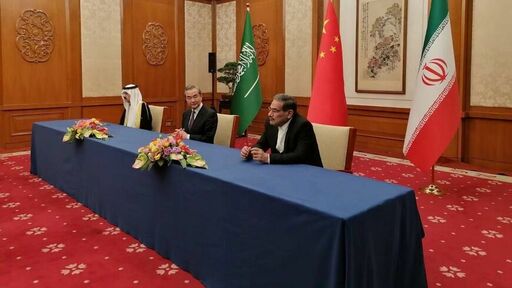On dreams and geopolitical chess – Zvi Bar'el in Haaretz:
‘Israel's dream of forming an Arab alliance against Iran was shattered on Friday with the news that Iran and Saudi Arabia have agreed to restore diplomatic ties within two months. The dramatic announcement is likely to redraw the regional map of friends and foes, and will have global reverberations. The agreement provides Iran with much-needed legitimacy in the Arab world, and could lead to further deals with Arab states like Egypt, pave the way to end the war in Yemen, offer a workable solution to the crisis in Lebanon, and even lead to a resumption of negotiations to save the nuclear deal.’
(…)
‘The disastrous war in Yemen, with over 150,000 deaths, has become a central point of contention between Washington and its European allies on one side and Riyadh. The brutal execution of journalist Jamal Khashoggi added fuel to the fire, turning Saudi leader Mohammed Bin Salman into persona non grata in Washington. U.S. President Joe Biden was only stating the obvious when he announced he wants to "recalibrate the relationship with Saudi Arabia."
At the same time, Iran had begun implementing its part of the nuclear deal, international firms were knocking at its doors, massive investment deals were finalized, and it seemed that Iran, who had judiciously followed the terms of the deal, was on its way to replace Saudi Arabia as a major American and Western ally. The Saudis' predicament didn't last long. Following Israeli pressure, President Trump withdrew from the nuclear deal, and advanced the 'deal of the century' along with the Abraham Accords and pushed for a regional anti-Iranian alliance.’
(…)
‘No real romance blossomed between the two leaders, and in October, Biden received a serious wake-up call when Saudi Arabia announced it would not raise oil production quotas, after Biden requested they do so to ease oil price hikes sparked by the war in Ukraine.
This wasn't the only blow laid by the Saudis. In December, four Saudi fighter jets escorted Chinese President Xi Jinping's plane as he landed on an official, or shall we say royal, visit to the kingdom. This wasn't his first visit, but this time he came to sign a strategic alliance agreement which included trade and investment deals worth tens of billions of dollars, and more importantly, developing nuclear power reactors designated for domestic energy production.’
(…)
‘This week, The Wall Street Journal reported that Saudi Arabia has asked for U.S. security guarantees and assistance with building up its civilian nuclear program as a condition for normalizing ties between the Arabian kingdom and Israel. But the U.S. Congress has been blocking such assistance.
It seems then that Saudi Arabia has found a solution in China, with whom it signed a nuclear reactor construction memorandum in 2017. In any case, the Saudis have presented the U.S. with a serious dilemma: help Saudi Arabia with its civilian nuclear program and potentially gain its support for a deal with Israel, or to let China reap the economic and political rewards.
China has become a major a strategic ally of both Saudi Arabia and Iran, with whom it signed a 400 million dollar economic cooperation agreement over 25 years. But both China and Iran know that fulfilling the potential of their alliance depends on signing a new nuclear deal. China has entered the fray as a mediator between Iran and Saudi Arabia in order to construct an alliance that serves the interests of all three without needing the services or assurances of the United States. More importantly, China is taking the United States' place as an economic and strategic power in the region. A power that Israel has little influence over.’
Read the article here.
China as the new power broker in the Middle East. It won’t be very much to the liking of the US, and it will influence the US_strategy vis-à-vis the war in Ukraine.
Countering China’s influence in the Middle East might be more important than countering Putin in Ukraine.
If you can sacrifice the Kurdish people for geopolitical reasons, other people can be sacrificed also.
